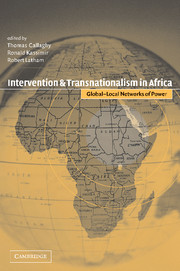Book contents
- Frontmatter
- Contents
- List of contributors
- Preface
- List of abbreviations
- 1 Introduction: transboundary formations, intervention, order, and authority
- Part I Historical dimensions and intellectual context
- Part II Theoretical frameworks
- Part III Transboundary networks, international institutions, states, and civil societies
- 6 Networks and governance in Africa: innovation in the debt regime
- 7 When networks blind: human rights and politics in Kenya
- 8 Global, state, and local intersections: power, authority, and conflict in the Niger Delta oil communities
- Part IV Political economies of violence and authority
- Part V Conclusion
- References
- Index
7 - When networks blind: human rights and politics in Kenya
Published online by Cambridge University Press: 18 December 2009
- Frontmatter
- Contents
- List of contributors
- Preface
- List of abbreviations
- 1 Introduction: transboundary formations, intervention, order, and authority
- Part I Historical dimensions and intellectual context
- Part II Theoretical frameworks
- Part III Transboundary networks, international institutions, states, and civil societies
- 6 Networks and governance in Africa: innovation in the debt regime
- 7 When networks blind: human rights and politics in Kenya
- 8 Global, state, and local intersections: power, authority, and conflict in the Niger Delta oil communities
- Part IV Political economies of violence and authority
- Part V Conclusion
- References
- Index
Summary
The tremendous growth of the non-governmental sector both in the Western and Southern world has lately also led to an increasing academic interest in the subject matter. In the human rights area, a sizable literature has emerged which identified international and domestic human rights groups and their networking activities as an increasingly influential factor for regime change (see Brysk 1993; Risse et al. 1999; Schmitz and Sikkink 2001; Smith et al. 1997). In particular, this literature highlights strategies on the part of those actors that aim at building direct connections between the local and the international level (see Keck and Sikkink 1998). These actions tell previously untold stories and represent attempts to connect what is traditionally separated by “Westphalian sovereignty” (Krasner 1999: 20–25) and the norm of non-intervention in internal affairs. Challenges to the status quo presuppose the emergence of alternative networks and discourses. The emergence of such transboundary formations in the non-governmental realm makes “extraversion” (Bayart 1993) a viable strategy not only for state leaders but also for their challengers. During the 1980s, international human rights organizations, but also Western states and international organizations, have increasingly taken up such requests for support and supplemented pressure from below with pressure from above. In the Kenyan case this has forced the regime under attack to adopt an introverted strategy of mobilizing its own domestic support.
- Type
- Chapter
- Information
- Intervention and Transnationalism in AfricaGlobal-Local Networks of Power, pp. 149 - 172Publisher: Cambridge University PressPrint publication year: 2001
- 6
- Cited by



